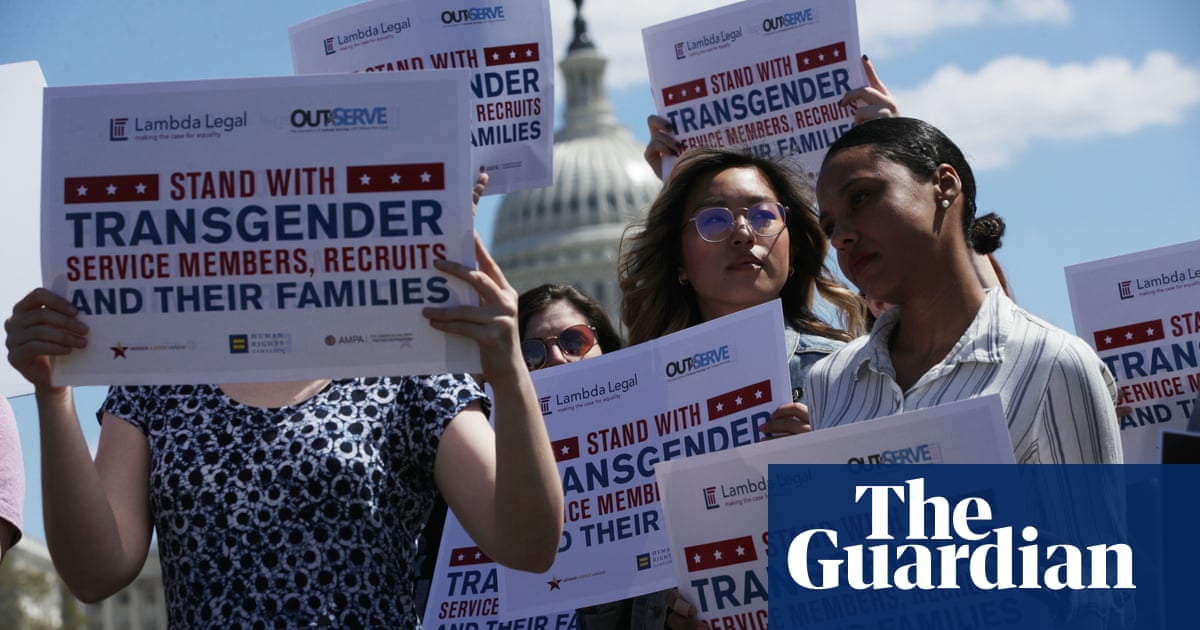TheTrump administrationhas asked the US supreme court to reinstate its ban on transgender troops serving in the armed forces after several judges issued separate rulings against it.
In the latest example of the White House appealing over federal judges’ heads to the court’s nine justices, the solicitor general, John Sauer, tabled a39-page briefasking them to stay an injunction issued last month by a district court in Tacoma, Washington, which upheld an earlier ruling preventing the policy being implemented.
The attempted exclusion of transgender people from the military stemmed from an executive order issue byDonald Trump, which asserted that the sexual identity of such troops harmed military readiness and “conflicts with a soldier’s commitment to an honorable, truthful, and disciplined lifestyle, even in one’s personal life”.
The order added: “A man’s assertion that he is a woman, and his requirement that others honor this falsehood, is not consistent with the humility and selflessness required of a service member.”
In arulingin March, Judge Benjamin Settle adjudicated in favor of several transgender service personnel who argued that the policy was discriminatory and insulting and that they would suffer damage and harm to their reputation by being discharged.
“The government’s arguments are not persuasive, and it is not an especially close question on this record,” wrote Settle, a former captain in the US army judge advocate general corps and an appointee of George W Bush. “The government’s unrelenting reliance on deference to military judgment is unjustified in the absence of any evidence supporting ‘the military’s’ new judgment reflected in the military ban.”
His ruling followed an earlier negative ruling from a Washington DC district court judge, Ana Reyes, which had issued a temporary injunction against the ban after saying it was “soaked in animus”.
“Its language is unabashedly demeaning, its policy stigmatizes transgender persons as inherently unfit, and its conclusions bear no relation to fact,” Reyes wrote.
“Indeed, the cruel irony is that thousands of transgender service members have sacrificed – some risking their lives – to ensure for others the very equal protection rights the military ban seeks to deny them.”
In a more limited ruling in March, a judge in New Jersey stopped the air force from discharging two transgender service members, who argued that they would suffer career and reputational damage that could not be financially compensated for.
The claims of reputation damage are addressed by Sauer in his brief. “Any argument that the 2025 policy will cause respondents reputational harm is unfounded given that any discharge under the policy will be honourable except where the service member’s record warrants a lower characterisation,” he writes.
“In any event, any harm to the respondents is substantially outweighed by the harm to the government and to the public from forcing the military to maintain a policy the Department [of Defense] has deemed inconsistent with ‘the best interests of the military services’” and with “the interests of national security’.”
The policy imposed by the defense secretary, Pete Hesgeth, in February allowed no exceptions to the ban.
Trump’s order is much more all-encompassing than a similar policy he announced during his first presidency, which prohibited transgender people from enlisting and allowed those already serving to continue in a manner consistent with their gender identities and to continue receiving transition-related medical treatment as long as they had come out before the ban.
The current policy, by contrast, prevents all transgender people from enlisting and requires the military to identify all service members “with a current diagnosis or history of, or exhibit symptoms consistent with, gender dysphoria”, according to aPentagon memo filed in the suit adjudicated by Reyes.
Trump’s initial ban was confirmed by the supreme court but scrapped by Joe Biden after he took office in 2021. Transgender troops were permitted to serve according to a Pentagon policy effected during Barack Obama’s presidency in 2016.
